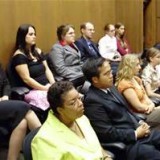Jury verdict “perverse” for denying damages.
On October 1, 2014 the BC Supreme Court, New Westminster Registry, ordered a retrial following a “perverse” jury finding in Kasli v Gill, 2014 BCSC 1833.
The plaintiff was injured in a motor vehicle collision. A jury found both parties equally to blame and, after factoring the liability split, awarded the plaintiff $10,000 for past wage loss and special damages. The Jury awarded nothing for non-pecuniary loss. Mr. Justice Weatherill ordered a new trial and in doing so provided the following reasons:
[23] While the court should strive to give effect to a jury’s verdict, it cannot do so where the jury’s verdict is internally in conflict.
[24] In this case, it is apparent that the jury did not accept the plaintiff’s evidence as to her losses. Put bluntly, the jury did not believe her. It is obvious, however, that the jury found that the plaintiff was injured, at least to some degree, by the award for special damages of $8,000 and past loss of earnings of $12,000.
[25] While the jury is the judge of issues such as credibility, it was not open to them, after making the findings as they did regarding special damages and past loss of wages, to fail to make any award for non-pecuniary damages (Balla). Such a result was inconsistent.
[26] The basis of any tort action rests on a finding that the plaintiff suffered an injury. It is illogical to conclude that a plaintiff was injured and suffered past wage loss and special damages but did not sustain and pain, suffering, or loss of enjoyment, no matter how transient. (Balla, Stewart).
[27] The issue, then, is whether this result necessitates a new trial (Rule 12-6(7)) or whether I can pronounce judgement on some of the claims and order a retrial on the balance (Rule 12-6(8)).
[28] There is a clear difference in wording of the two rules that sheds some light on the issue. Rule 12-6(7) demands a retrial when either:
a) a jury answers some but not all of the questions directed to it, or
b) the jury’s answers are conflicting so that judgement cannot be pronounced on the findings.
[29] Conversely, Rule 12-6(8) allows partial judgment when a jury’s answer entitles a party to judgement in respect of some but not all of the claims of relief. It does not contemplate partial judgment when the jury’s answer is conflicting.
[30] Respecting the jury’s finding of liability between the parties for the collision, that question has been answered. There is nothing in the rest of the jury’s verdict that is inconsistent with it.
[31] Respecting the jury’s finding on damages, an inconsistency exists. An award for special damages and past wage loss and no award for non-pecuniary damages have repeatedly been characterized in all the relevant case law as a “conflict” and an “inconsistent result”.
[32] This conclusion is reinforced by Balla, Banks and Binnie v. Marsollier, 2001 BCCA 543. Re-trials were ordered in all three pursuant to Rule 41(2) (now Rule 12-6(7)). There was no mention of the potential application of Rule 41(3) (now Rule 12-6(8)).





